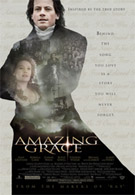When you hear that the title of a movie is Amazing Grace it’s hard not to be at least a little dismissive. Seriously, if a movie is going to name itself after a popular 18th century Christian hymn I for one immediately become suspicious that I’m in for some kind of superficial, over-the-top, spiritually exaggerated, feel-good chronicle of some song-writing minister’s conversion. To my great surprise the film is far from any of those things, except maybe a touch in the feel-good department. But that’s not at all inappropriate for the story of how Great Britain overthrew its deep seeded association with the slave trade.
In fact, the movie isn’t really about the hymn at all, though it and its author John Newton (Albert Finney) figure into the story. The based on the true-life story, the plot centers on William Wilberforce (Ioan Gruffudd), the young member of Britain’s parliament who spent nearly two decades actively working to pass a law that would abolish his nation’s reliance on the slave trade. Despite massive support from his close personal friend, then Prime Minister William Pitt (Benedict Cumberbatch) and the influential Lord Charles Fox (Michael Gambon), Wilberforce struggled against powerful members of parliament lead by Lord Tarleon (Ciarán Hinds) and the Duke of Clarence (Toby Jones) who feared that abolition would lead to a collapse of Britain’s economy.
If all those names and historical references sound a little dry, that’s because this sort of storytelling usually is. Left to less capable hands the movie could have quickly turned into a second-rate biography, the kind that only runs very late at night on The History Channel. Director Michael Apted, however, has carefully carved out a magnificent drama that focuses more on the people than the events. Smart, entertaining and full of vivid, fascinating personalities, it’s a simple reminder that historical movies don’t have to be ridiculously exaggerated or larger than life to make the true story stirring.
As a character piece, the movie soars on wings lent to it by a tremendously talented ensemble cast. Most Americans know Ioan Gruffudd as Reed Richards from Fantastic Four, but I’ve been a fan since his early days playing Horatio Hornblower in the movies based on C. S. Foresters famous British Naval stories. Gruffudd is in his element with these types of period pieces and this is absolutely his best performance yet. Blend in icons like Gambon, Finney and Hind and round it out with classic character actors such as Hinds and Jones, give them all rich roles to sink their teeth into, and the result is nothing less than pure cinematic genius.
The movie’s rich costumes, lavish sets and subtle cinematography are exquisite though they’re so perfectly woven into the fabric of the film that it’s easy to miss the magnificence of those finer features. The movie recreates the England of the day with such detail and confidence of authenticity that I left feeling it might have actually been filmed back in the 1800s.
Politics can be a boring subject to broach in film, but since Britain fought their war against slavery on the floor of Parliament and not the battlefield, the political angle is core to the movie. Thanks to a smart director, clever script and quick cast, that doesn’t slow it down one bit. I especially enjoyed the witty bickering, jeering, and verbal backhanding amongst the members during the Parliament session scenes. At the risk of sounding nerdy, I’ll admit that I get a kick out of watching England’s present day Parlaiment in session on C-SPAN and apparently it wasn’t much different then than is now. Those Brits may be boring as heck at tea or in an Emily Bronte novel, but get them into legislative session and let the intellectual smack-down fest begin.
With its dubious title and fluffy PG rating I fully expect the movie to be generally ignored by American audiences, but it will truly be their loss. The best movie I’ve seen this year so far, and likely to be best of its kind I’ll see all year, Amazing Grace won’t leave you disappointed.
Your Daily Blend of Entertainment News

